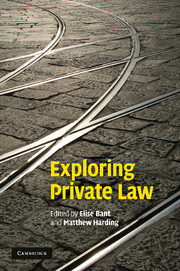Book contents
- Frontmatter
- Contents
- List of Contributors
- Foreword
- Acknowledgments
- Table of Cases
- Table of Legislation
- Introduction
- I Method
- 1 Do top-down and bottom-up reasoning ever meet?
- 2 Internationalization or isolation: the Australian cul de sac? The case of contract law
- 3 The Australian law of restitution: has the High Court lost its way?
- 4 Privacy and private law: developing the common law of Australia
- 5 Towards legal pragmatism: breach of confidence and the right to privacy
- 6 Teaching trust law in the twenty-first century
- II Unjust enrichment
- III Equity and trusts
- IV Remedies
- Index
- References
1 - Do top-down and bottom-up reasoning ever meet?
Published online by Cambridge University Press: 10 November 2010
- Frontmatter
- Contents
- List of Contributors
- Foreword
- Acknowledgments
- Table of Cases
- Table of Legislation
- Introduction
- I Method
- 1 Do top-down and bottom-up reasoning ever meet?
- 2 Internationalization or isolation: the Australian cul de sac? The case of contract law
- 3 The Australian law of restitution: has the High Court lost its way?
- 4 Privacy and private law: developing the common law of Australia
- 5 Towards legal pragmatism: breach of confidence and the right to privacy
- 6 Teaching trust law in the twenty-first century
- II Unjust enrichment
- III Equity and trusts
- IV Remedies
- Index
- References
Summary
Michael Bryan has always recognized the importance of legal theory in private law. And he understands the influence of broad categories or concepts upon judicial decision-making. In the tradition of Julius Stone, he has repeatedly demonstrated that those who claim to be doing no more than applying the apparent logic of specific precedent, or ‘reasoning from the bottom up’, are inevitably making choices about the premises and precedents used, and basing those choices upon extrapolated doctrines of broad import.
Thus, in a recent analysis of the judgments of Callinan J, Michael stated:
Maynard Keynes's dictum that ‘[p]ractical men, who believe themselves to be quite exempt from any intellectual influences, are usually the slave of some defunct economist’ is as applicable to practical lawyers as it is to practical business executives. The decisions made by ‘practical judges’ owe as much to legal philosophy as the decisions made by successful managing directors owe to economic theory. The only qualification we should make is that the ‘defunct’ economist or legal theorist is not necessarily discredited, even if he may no longer be fashionable. Legal theory leaves its mark on even the most routine legal decisions, not just in the much discussed ‘hard cases’, but most of the time the theory remains behind the scenes.
Michael's thesis was that the particular judge showed a strong preference for achieving corrective justice, and a corresponding reluctance to take into account arguments based on considerations of distributive justice.
- Type
- Chapter
- Information
- Exploring Private Law , pp. 19 - 40Publisher: Cambridge University PressPrint publication year: 2010

